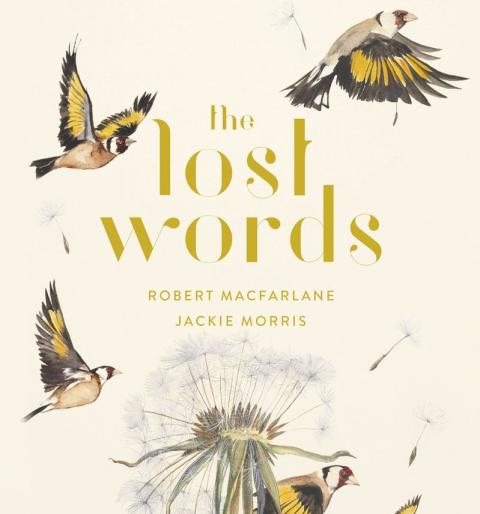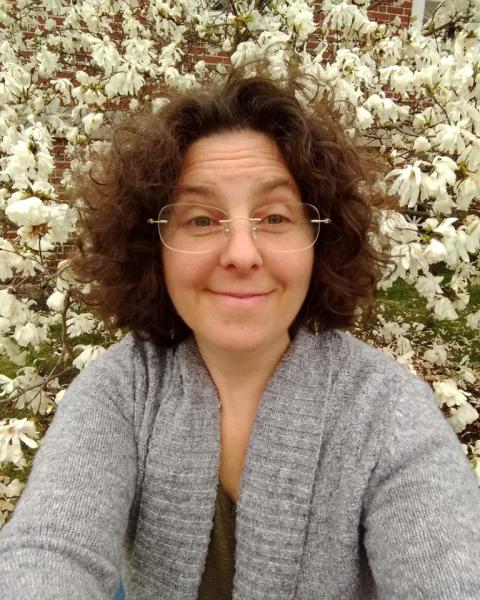The Lost Words: A Nature Spell Book for Kids and Adults

Review by Michele Augeri, NRS 2018
What sets us apart from all of our kith and kin in the animal kingdom is not our upright stance or our opposable thumbs but our absolute dependence on words. Certainly other species have their own forms of communication and maybe even languages, but it appears that we alone give precious weight to words. Words evoke sensations (scents, images, sounds), emotions (joy, fear, grief, anger) and memories. Words are how we orient ourselves in place and time, organize and understand our world. Words are how we connect to our experiences and to the other living beings in our lives. What do we do with the places and creatures in our lives that we come to love? We name them.
Which is why people who love the natural world are increasingly concerned about the loss of “nature words” – especially within the mouths and minds of children. Not only are children increasingly dislocated from the actual wilderness of outdoors, but the words to describe the plants and creatures that they would find there are diminishing as well.
In 2007, many common words describing the natural world disappeared from the new edition of the Oxford Junior Dictionary (OJD), which is aimed at seven-year-olds and is widely used in schools around the world. These lost words included acorn, adder, almond, ash, beech, blackberry, bluebell, bramble, buttercup, catkin, conker (the British word for buckeye), chestnut, clover, cowslip, crocus, cygnet, dandelion, fern, hazel, heather, heron, herring, ivy, kingfisher, lark, leopard, lobster, magpie, minnow, mistletoe, moss, mussel, nectar, newt, otter, ox, oyster, panther, pasture and willow. New additions to the OJD included analogue, attachment, block graph, blog, broadband, bullet-point, celebrity, chatroom, committee, cut-and-paste, database, MP3 player and voice-mail.
Oxford University Press (OUP), which produces the OJD, explained the changes this way: “Are words about nature being replaced with words about technology? It’s not really that simple. We don’t directly replace one word with another word. We have an ongoing language research programme (sic) which ensures our dictionaries include words that children use in the classroom and words they hear in everyday use, which includes nature and technology words. The dictionary is powered by the Oxford Children’s Corpus, a unique database of millions of words written by and for children, to ensure our dictionaries contain words children come across and use.” In other words, the OJD does not prescribe which words should have relevance in a seven-year-old’s life, it simply reflects which words in fact do.
In 2015, the naturalist Laurence Rose with 28 artists and writers sent an open letter to Oxford University Press (OUP) imploring the publisher to reinstate the lost words to the next edition of the OJD. Their appeal finished with the following statement: “Will the removal of these words from the OJD ruin lives? Probably not. But as a symptom of a widely acknowledged problem that is ruining lives, this omission becomes a major issue. The Oxford Dictionaries have a rightful authority and a leading place in cultural life. We believe the OJD should address these issues and that it should seek to help shape children’s understanding of the world, not just to mirror its trends. We believe that a deliberate and publicised (sic) decision to restore some of the most important nature words would be a tremendous cultural signal and message of support for natural childhood, and we ask you to take that opportunity, and if necessary, bring forward the next edition of the OJD in order to do so.”
The signatories of this letter included the illustrator Jackie Morris and the environmental writer and word collector Robert Macfarlane. They began a conversation and then a collaboration on a book (ostensibly for children but appealing to anyone) to “summon up” 20 of the OJD’s discarded words in a “spell book” which would symbolically restore not only the words to the minds of its readers, but the creatures invoked to their diminished landscapes as well. The book was titled “The Lost Words”. The chosen “lost words” celebrate the very common in nature (acorn, blackberry, kingfisher, otter, willow): things which should not be impossible for the average British or American child to find.
Morris originally intended to illustrate each word and provide its definition (a “wild dictionary”) but MacFarlane suggested a more evocative approach: …”It was Robert’s idea to make this a ‘spell-book’ – to have three spreads per word, the first marking a loss, a slipping away; the second being a summoning spell; and the third being the word spelled back into language, hearts, minds and landscape.”
Using watercolors and gold-leaf, Morris created images of natural beings which are somber, ancient, formal and sacred (as in illuminated medieval manuscripts or religious icons) -- but which are simultaneously vibrant, wild and immediate. “We wanted it to be quite unlike any other book that exists,” says MacFarlane, “…to catch at the beauty and wonder -- but also the eeriness and otherness -- of the natural world.”
“The Lost Words” was published in Britain in 2017 and in North America in 2018 and has become both the spark and touchstone of a global movement to restore both the natural words and the natural world, especially for children, and most especially those children who never have an opportunity to wander outside under trees, along stream edges and through fields which unfortunately are now legion.
Instilling a love of the natural world and all of the biodiversity it contains is not just a romantic nostalgia for a distant, greener time. As the poet Wendell Berry wrote, "We know enough of our own history by now to be aware that people exploit what they have merely concluded to be of value, but they defend what they love. To defend what we love we need a particularizing language, for we love what we particularly know."
FREE DOWNLOADABLE RESOURCES TO USE WITH CHILDREN WITH “THE LOST WORDS”
Free Resources to Use in Connection with “The Lost Words” created by the John Muir Trust, including An Explorer’s Guide to The Lost Words; Free Posters; Crowdfunder & Campaign information; ‘In Action’ examples (how classrooms are using the book and the exercises); articles; A Literacy & Nature Resource Guide (from the John Muir Trust); and Literacy & Nature for Educators: Session Guidance (for running your own training sessions using The Lost Words resources)
https://www.johnmuirtrust.org/initiatives/the-lost-words
“The Lost Words by Robert Macfarlane - an Activity Pack”. A free educational resource created by the book’s original UK publisher, available at The Reading Agency website
https://readingagency.org.uk/resources/3026/
The Lost Words Challenge Cards – more free educational resources
https://www.teachwire.net/uploads/products/The_Lost_Words_Challenge_Cards.pdf
or
https://www.sustainablelearning.com/resource/lost-words
BIBLIOGRAPHY
“Reconnecting kids with nature is vital, and needs cultural leadership” open letter to the Oxford University Press, (1/12/ 2015)
http://www.naturemusicpoetry.com/uploads/2/9/3/8/29384149/letter_to_oup_final.pdf
“Another Extinction: Words We Use to Describe the Natural World”. By Jack Turner, Our World (website of the United Nations University, (1/19/2016)
https://ourworld.unu.edu/en/another-extinction-words-we-use-to-describe-the-natural-world
“The making of a modern 'spell-book’”. At the Penguin Books Publisher’s website, (7/15/ 2017)
https://www.penguin.co.uk/articles/2017/designing-the-lost-words/
“Badger or Bulbasaur - have children lost touch with nature?” By Robert MacFarlane, The Guardian, (9/30/2017)
https://www.theguardian.com/books/2017/sep/30/robert-macfarlane-lost-words-children-nature
“How the loss of vivid, exacting language diminishes our world”. By Meara Sharma, Washington Post, (12/8/2017)
https://www.washingtonpost.com/outlook/how-the-loss-of-vivid-exacting-language-diminishes-our-world/2017/12/08/4630e920-c265-11e7-84bc-5e285c7f4512_story.html?utm_term=.8cd6c7577956
“The spellbinding power of reading nature’s lost word aloud”. By Lila MacLellan, Quartzy, (12/18/ 2018)
https://qz.com/quartzy/1480959/if-you-love-nature-here-are-20-words-to-say-aloud/
Michele Augeri is an artist, librarian and enthusiastic amateur naturalist. A self-proclaimed “bibliobiophile” (not a real word but it should be), her collection of books on plants, animals, natural history and gardening weighs more than your average moose.

